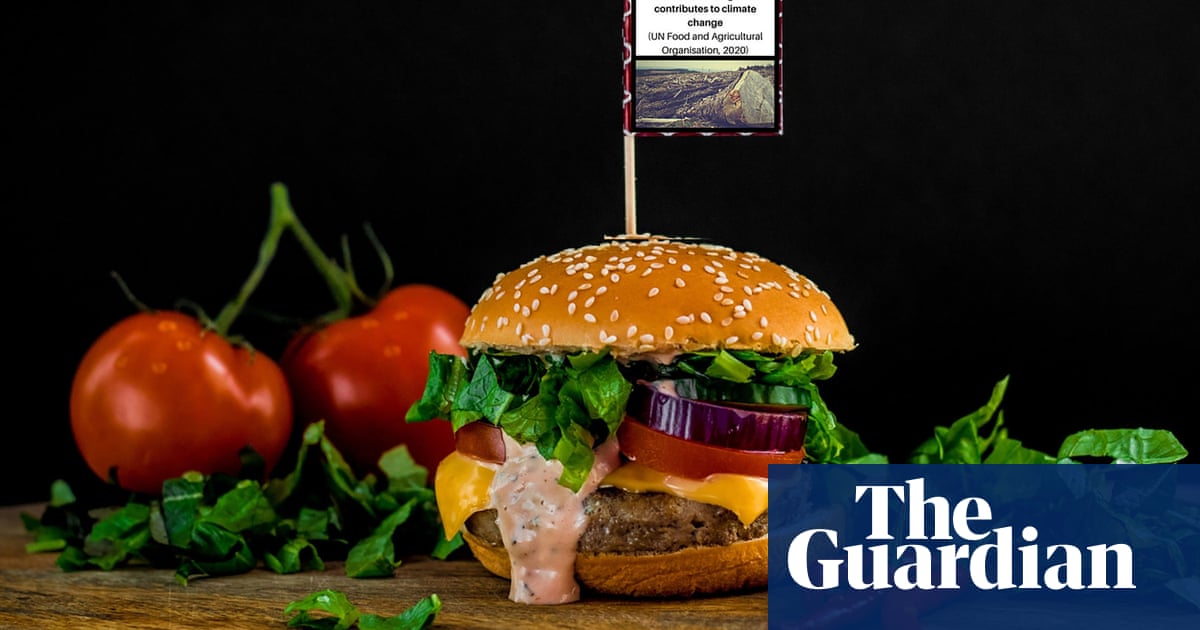People are used to seeing stark warnings on tobacco products alerting them about the potentially deadly risks to health. Now a study suggests similar labelling on food could help them make wiser choices about not just their health, but the health of the planet.
The research, by academics at Durham University, found that warning labels including a graphic image – similar to those warning of impotence, heart disease or lung cancer on cigarette packets – could reduce selections of meals containing meat by 7-10%.
It is a change that could have a material impact on the future of the planet. According to a recent YouGov poll, 72% of the UK population classify themselves as meat-eaters. But the Climate Change Committee (CCC), which advises the government on its net zero goals, has said the UK needs to slash its meat consumption by 20% by 2030, and 50% by 2050, in order to meet them.



But “finishing” is most of the weight gain of the animal and all the flavor.
It’s like arguing all cows are milk-fed because they were calves once.
i’m not arguing all cows fit the definition of “grass fed”. i’m saying most cows mostly eat grass.
no, it’s not. its about 4-6 months of an 18-20 month lifespan. most of their growing is done when they get to the feed lot.
edit:
The US is highly unusual in just how much Corn dominates food production and that most definitelly impacts the beef production which does included the feeding of corn to cattle (it’s actually what creates the “marbling” in american beef) which would otherwise not be done because it’s actually bad for the digestive system of cattle (there’s a book called “The Omnivore’s Dilema” that’s well worth reading) and is linked to other problems like the preventive use of antibiotics with cattle because the animals are more susceptive to disease (which in turn affect humans because it leads to increased antibiotic resistance in bacteria).
However in countries were Corn is not so insanelly dominant, the cattle is actually grown the proper way, so mainly grass fed as per your illustration.
Both you and the other poster are correct, IMHO, it’s just that each is talking about a very different locally dominant version of the beef production industry than the other.
no, we’re both talking about american beef.
Right, then either things changed lot in Industrial Cattle Raising in the US since “The Ominvore’s Dilema” was written or you’re only talking about a whole different segment of the industry that’s not most of the beef production in the US.
false dichotomy
Well, I didn’t want to mention the possibility that you’re ill-informed, missusing unapplicable or segment specific information and/or oversimplifying things, since I didn’t want to be unpleasant, and I have serious doubts that the book I mentioned was wrong in that since I have yet to see anything disproving it (quite the contrary, it has been lauded as an exposée of industrial farming in the US).
But yeah, there are indeed more possible explanation than merelly the ones I posited in my previous post.
when did you read your 20-year-old book last? are you sure you’re remembering it correctly? are you sure it’s still accurate?
Well, that’s why one of the two possibilities I posited in my original post which you identified as a false dichotomy, was exactly that things might have changed since I read that book.
I remember that specific part very clearly because it was so shocking for me as an European, but indeed as we both mentioned, things might not be the same anymore, which is why I very explicitly mentioned in post that exactly caveat.
there’s also the possibility you are doing this (even if you don’t know it)
Indeed.
Which is why I explicitly mentioned my reference source and even pointed out things have changed in the meanwhile, and why in general I have tried to refrain from making absolutist “I know it all” statements.
I’m well aware of not being a domain specialist.
my source comes from the oklahoma state agricultural extension. i doubt your book contradicts them, but if it does, then i’m going to trust the university over michael polan’s 2-decades old research.